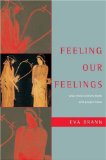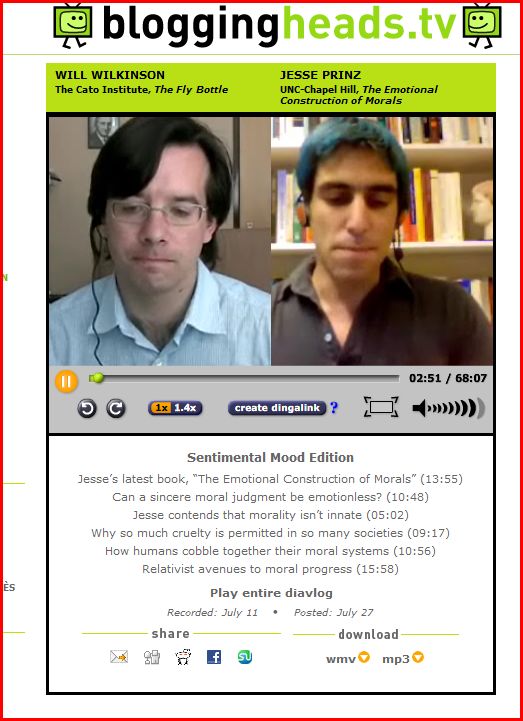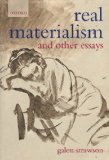September 24, 2008

Feeling Our Feelings: What Philosophers Think and People Know by Eva Brann (Paul Dry Books, 2008) has a publication date of Oct 1 according to Amazon.
Product Description
In Feeling Our Feelings, Eva Brann considers what the great philosophers on the passions and feelings have thought and written about them. She examines the relevant work of Plato, Aristotle, the Stoics, Aquinas, Descartes, Spinoza, Adam Smith, Hume, Kierkegaard, and Heidegger, and also includes a chapter on contemporary studies on the brain. Feeling Our Feelings provides a comprehensive look at this pervasive and elusive topic.
The publisher also offers an excerpt:
“Feeling our feelings” comes from the words a little boy called Zeke said to me some thirty years ago when he was four. I was swinging him in a park in Cambridge, Massachusetts, and not doing it right. “Swing me higher,” he said, “I want to feel my feelings.” The phrase stuck with me; you might say it festered in my mind; it agitated questions: Why do we all want to feel our feelings, so generally that people “not in touch” with them are thought to be in need of therapy? What feeling was swinging high inducing? Was it an exultation of the body or an exhilaration of the soul? When he wanted to be feeling his feelings, was there a difference between the general feeling, the mere consciousness of being affected, and his particular feelings, the distinguishable affects?—as, when you sing a song, there is a difference between the singing done and the song sung—or is there? —Eva Brann, from her Preface
Comments (1)
- new books,philosophy of mind
September 9, 2008
Barry C. Smith discusses neuroscience topics — such as blindsight, mirror neurons, and alien hand syndrome — in relation to philosophy at Philosophy Bites.
Comments (0)
- cognitive science,philosophy of mind

Distraction: A Philosopher’s Guide to Being Free by Australian philosopher Damon Young (Melbourne University Publishing, 2008), may already be available in Australia but hasn’t made its way to the US yet. (Also a pre-order at amazon.ca and amazon.co.uk.)
Book website is here, with links to reviews, an excerpt, and more.
Product Description
Exploring the nature of distraction, the popular philosophy surrounding it, and its role in modern life, this book surmises that distraction is often a matter of what one values. Written in a playful tone, this view analyzes important aspects of life, showing that technology, acquaintances, jobs, and addictions often waste time and energy. Through the history of popular philosophy, it is demonstrated that patient, sensitive, and thoughtful attention to the world suggests that the opposite of a life of distraction is one of grateful appreciation.
Comments (2)
- culture,new books,philosophy of mind
July 27, 2008
Jesse Prinz, author of The Emotional Construction of Morals talks to Will Wilkinson at Bloggingheads.tv.

It takes them a few minutes to get rolling…
More on Jesse Prinz (with links to papers)
Comments (0)
- mind,philosophy of mind,psychology
July 25, 2008
 Real Materialism: and Other Essays by Galen Strawson (Oxford University Press, 2008). Amazon claims to have it in stock, while Oxford says it hasn’t been published yet. Product description:
Real Materialism: and Other Essays by Galen Strawson (Oxford University Press, 2008). Amazon claims to have it in stock, while Oxford says it hasn’t been published yet. Product description:
Real Materialism draws together papers written over twenty years by Galen Strawson in philosophy of mind and metaphysics. Strawson focuses on five main areas of enquiry: [1] the nature of the physical, consciousness, the “mind-body problem”, and the prospects for panpsychism; [2] the self, the subject of experience, self-consciousness, and the “narrative” self; [3] free will and moral responsibility; [4] the nature of thought and intentionality and their connection with consciousness; [5] the problem of causation with particular reference to the philosophy of David Hume.
Table of Contents from the publisher:
Introduction
1. Real Materialism
2. Realistic monism: why physicalism entails panpsychism
3. Can we know the nature of reality as it is in itself?
4. Red and ‘red’
5. Self, body, and experience
6. What is the relation between an experience, the subject of the experience, and the content of the experience?
7. Against narrativity
8. Episodic ethics
9. Mental ballistics: the involuntariness of spontaneity
10. Intentionality and experience: terminological preliminaries
11. Real intentionality: why intentionality entails consciousness
12. On the inevitability of freedom (from the compatibilist point of view)
13. The impossibility of moral responsibility
14. Consciousness, free will, and the unimportance of determinism
15. Free agents
16. Realism and causation
17. The contingent reality of natural necessity
18. David Hume: objects and power
19. Epistemology, semantics, ontology, and David Hume
Bibliography
Index
“Against Narrativity” is available online (probably an earlier version than the one in the book). Strawson argues against the narrative view of the self in both descriptive and normative versions based on a distinction between Diachronic and Episodic forms of self-experience. The Episodic “has little or no sense that the self that one is was there in the (further) past and will be there in the future, although one is perfectly well aware that one has long-term continuity considered as a whole human being. Episodics are likely to have no particular tendency to see their life in Narrative terms.”
Comments (0)
- new books,philosophy of mind






